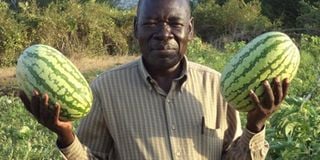Why grow what everyone else is farming?

John Osodo at his melon farm in Sori, Migori Country. PHOTO | EVERLINE OKEWO | NATION MEDIA GROUP
What you need to know:
- Osodo farms melons in a village where the fleshy fruits are strange to many people.
A trip to Sori in Nyatike Constituency, Migori County, is not for the faint-hearted.
The earth road leading to the area is too bumpy for comfort. Only motorbike riders, who are doing booming business in the region, seem to know how to manoeuvre around the boulders and huge potholes on the road.
Seeds of Gold was in this outpost to meet farmer John Osodo, who has become a sensation for growing watermelons, a crop unique to many people in the area.
“We have good agricultural land, a relatively good climate and the will, but the problem is the road. Taking the produce to the market is a big challenge,” says Osodo, a retired nurse.
But the poor state of the road has not dampened the spirit of the farmer, whose produce has no market in the neighbourhood.
Many farmers in Sori plant sugarcane, maize, tobacco and tomatoes.
The farmer has planted the melons, which are due in two weeks, on three and quarter acres.
“I grow the crops under furrow irrigation. I use plastic pipes to direct water into the furrows to reach the melons,” says the farmer, who was motivated to go into the business after seeing how melons have high demand in urban areas.
Osodo first planted 250g of Sukari F1 hybrid variety last November.
“Melons take approximately 75 days to mature. I get the seeds from agrovets in Kisii, the 250g pack goes for Sh7,500.”
To grow the crop, Osodo starts by ploughing the land to a fine tilth. “I then use hands to plant the seeds about 2cm into the soil. If the seeds are sowed deep, they will take longer to germinate, sometimes two weeks instead of one,” says the farmer, adding that the crops are spaced about a metre apart.
Osodo normally plants the crops with NPK fertiliser to improve the soil fertility and increase yields.
“Applying fertiliser during the initial stages of planting helps to boost nutrients and make the fruits grow bigger.”
Last year, the pioneer farmer harvested 5,000kg of watermelons.
“I sell each melon at Sh30 and a kilo at between Sh300 and Sh350. Last season my first harvest earned me Sh150,000, this season I expect about Sh180,000 after harvesting at least 8,000kg of melons,” says Osodo, who sells the fruits to traders who visit his farm, buy and take them to Nairobi, Busia and Kakamega.
PESTS
His biggest challenge includes pests, namely white and red flies. They lay eggs on the fruits forming maggots that affects the entire produce.
Red flies, on the other hand, consume leaves of the plants affecting production.
Another challenge is hippos, which often wander from the lake that is 20m away into his farm. Compared to tomatoes and onions, which he planted two years ago when he went into commercial farming, Osodo notes growing watermelon is not labour intensive and the returns are good.
“Two years ago, I spent Sh50,000 on tomato farming and got a profit of Sh20,000 on the same piece of land that I harvested five tonnes of melons,” says the retired medic whose final posting was in South Sudan and he returned home when war broke out last year.
“I feel lonely growing watermelons here, but I don’t regret because there is little competition. Many people in the area are unaware that watermelon can be consumed,” says Osodo, adding that he will continue growing the crop because of its high demand.
Amos Amenya, a senior agronomist at the Lake Basin Development Authority, Kisumu, says watermelon is a high value crop.
“Watermelon has good returns but not many people have embraced it especially in rural areas. It is good to pioneer such crops because one helps to open peoples’ eyes.”
He notes that melons are not labour intensive and when farmers apply integrated pest management, production costs decline. “Farmers should always spray pesticides on the crops regularly to ward off diseases.
They should also use folia fertiliser to increase the yields. NPK fertiliser should, however, be applied during the planting season.”





